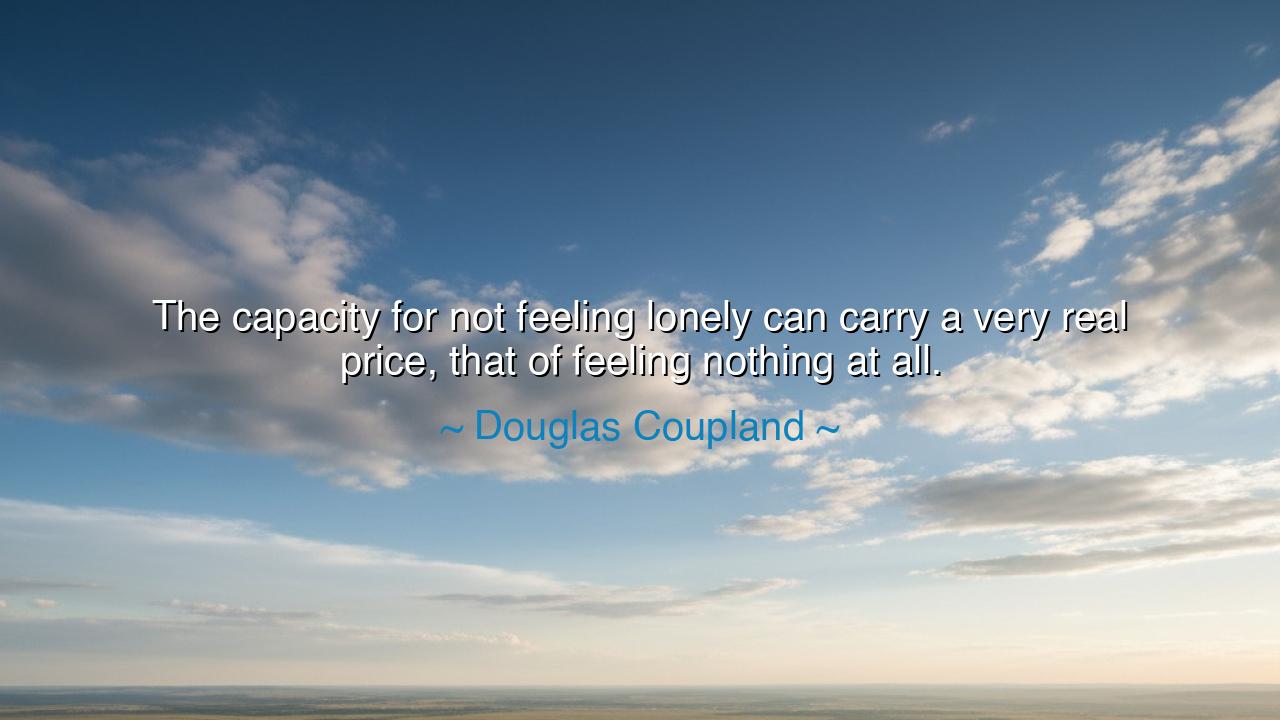
The capacity for not feeling lonely can carry a very real price
The capacity for not feeling lonely can carry a very real price, that of feeling nothing at all.






Douglas Coupland delivers a profound reflection on the human condition with his statement, "The capacity for not feeling lonely can carry a very real price, that of feeling nothing at all." In these words, he strikes at the heart of an essential paradox: that solitude and emotion are not opposites, but forces that are deeply entwined. To master the art of not feeling lonely—to find contentment within oneself—is a powerful gift. Yet, as Coupland warns, this mastery can come at a cost: the potential to become numb, to become detached from the very emotions that give life meaning. In the quest for peace and independence, we may lose the ability to experience the full depth of feeling, both the highs and the lows that make us human.
From the dawn of philosophy, there has been an understanding that the balance between connection and detachment is delicate. Aristotle taught that virtue lies in the balance of extremes. Too much attachment to others or to one's emotions can lead to a life of imbalance and suffering, but too much detachment—too much indifference—can rob a person of the richness of life. In seeking to avoid the pain of loneliness, one must be cautious not to fall into the trap of numbness, where neither joy nor sorrow is felt. True wisdom, then, lies not in rejecting loneliness or emotion, but in learning to embrace them fully, allowing them to move through us without letting them control or consume us.
The story of Marcus Aurelius, the Stoic philosopher and Roman Emperor, provides a striking example of this tension. As a Stoic, Marcus Aurelius sought to maintain a deep sense of inner peace, believing that emotions should not overpower the mind. Yet, in his famous work Meditations, he reveals the struggles he faced as he sought to balance his public duties with his personal reflection. He often spoke of the necessity of detaching from the external world, of cultivating a tranquil mind, but it was clear that this quest for inner peace was not without its challenges. He wrestled with the question of how to remain connected to others without losing his sense of self. Loneliness, for him, was a danger to be avoided, but in avoiding it, he sometimes wondered if he had lost touch with the emotions that make life worth living.
In a more modern context, the writer Sylvia Plath embodies the tragedy of this very struggle. Plath, in her search for identity and understanding, withdrew from the world at times, seeking peace within her own thoughts. Yet, this detachment—this avoidance of the pain and messiness of life—eventually led to a sense of deep numbness. Her inability to reconcile the need for connection with her desire for isolation resulted in profound loneliness and, ultimately, despair. Her writings are filled with the echoes of this conflict—the desire to feel deeply, yet the fear that feeling too much would bring her to the brink of madness. In this, Plath’s life becomes a tragic illustration of Coupland’s warning: that the cost of avoiding loneliness and emotional vulnerability can be the loss of the ability to feel anything at all.
The lesson here is not to shy away from loneliness or emotional depth, but to face them courageously, recognizing that both are integral parts of the human experience. We must understand that numbness, that refusal to feel, is not a solution, but a trap. True strength lies not in the avoidance of pain but in the willingness to embrace it, to feel both the sorrow and the joy that life brings. The capacity to feel deeply, to love fully, to mourn and to rejoice—these are the elements that give life its meaning. To seek to block them out in the pursuit of solitude or inner peace is to miss out on the richness of the journey.
Thus, I urge you, dear reader, to seek not the absence of loneliness or emotion, but their integration into a life well-lived. If you feel the sting of loneliness, do not run from it, for in its presence lies an opportunity to grow and reflect. If you experience sadness, do not push it away, for in sadness, we often discover the depths of our humanity. And when joy fills your heart, welcome it with open arms, for in joy we touch the divine. To feel, to live, is the essence of what it means to be human.
So, let Coupland’s words serve as a reminder: detachment from the world and from our emotions can lead us to a place where we feel nothing at all, and that is a price far too high to pay. Instead, let us choose to feel—to embrace both the light and the dark, the joy and the sorrow, for it is through these contrasts that we find the full richness of life. Only then can we truly live, fully and without regret, feeling deeply the heartbeat of the world around us.






AAdministratorAdministrator
Welcome, honored guests. Please leave a comment, we will respond soon